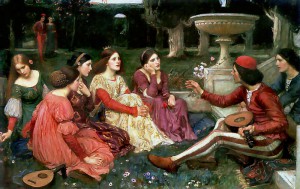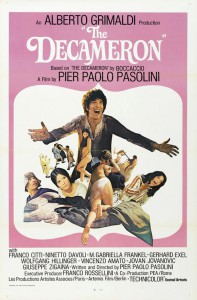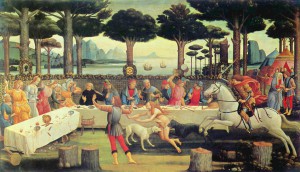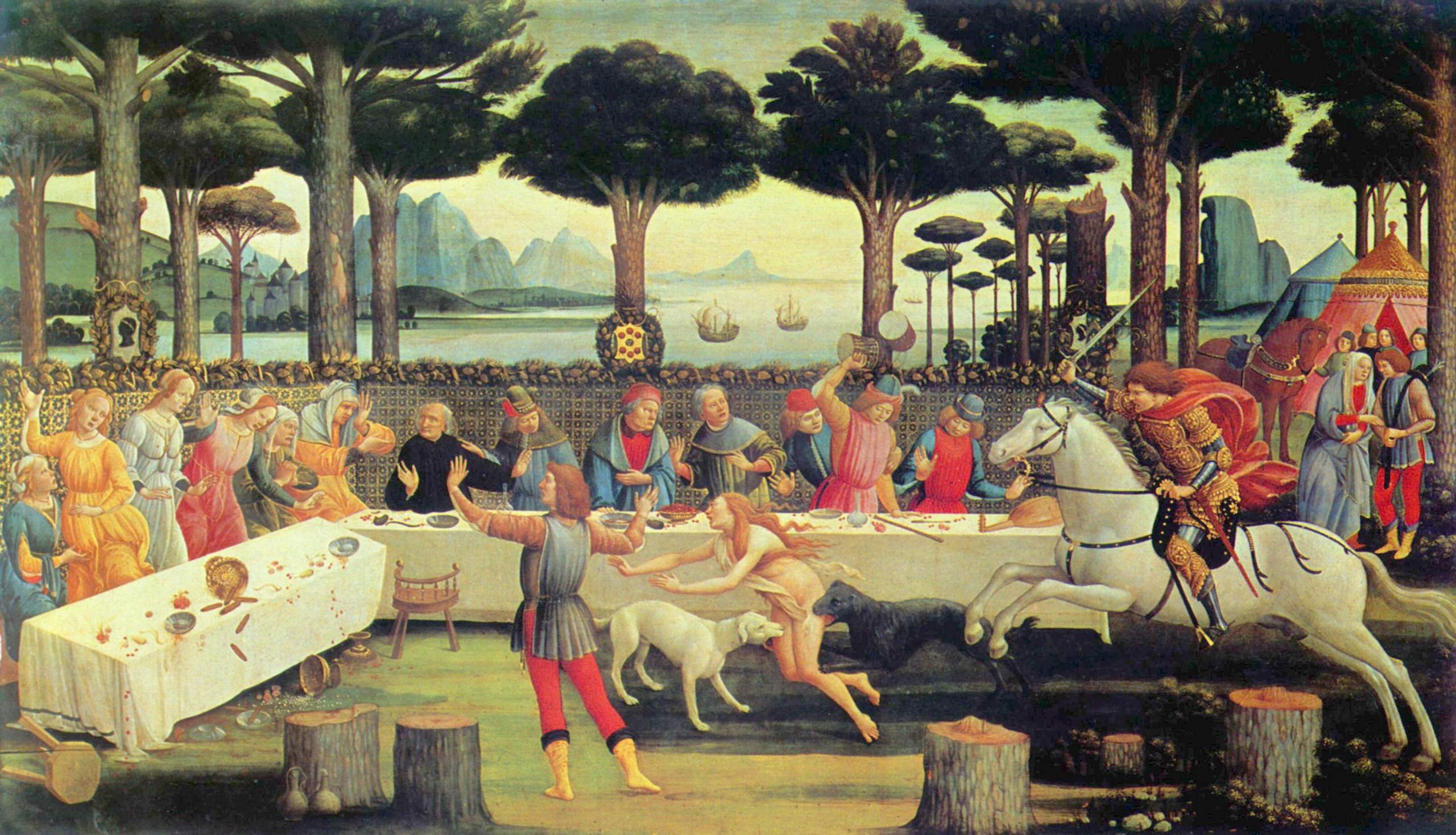 On the 700th anniversary of Giovanni Boccaccio’s birth, it is interesting to note that his name has become homonymous with The Decameron, his most known and praised work. It was not always so. For almost four hundred years, De Casibus Virorum Illustrium was the most celebrated, read and better known of his works. Not to say that the Decameron was not acknowledged to be a masterpiece that influenced, directly and indirectly, many authors throughout the centuries, such as Shakespeare, Lessing, Marguerite de Navarre, Jonathan Swift, Molière, George Eliot, Wieland, Lope de Vega, John Keats and Chaucer, to name a few. One of the tales from the Decameron was also borrowed by Giuseppe Petrosinelli for his libretto for Domenico Cimarosa’s opera “The Italian Girl in London”.
On the 700th anniversary of Giovanni Boccaccio’s birth, it is interesting to note that his name has become homonymous with The Decameron, his most known and praised work. It was not always so. For almost four hundred years, De Casibus Virorum Illustrium was the most celebrated, read and better known of his works. Not to say that the Decameron was not acknowledged to be a masterpiece that influenced, directly and indirectly, many authors throughout the centuries, such as Shakespeare, Lessing, Marguerite de Navarre, Jonathan Swift, Molière, George Eliot, Wieland, Lope de Vega, John Keats and Chaucer, to name a few. One of the tales from the Decameron was also borrowed by Giuseppe Petrosinelli for his libretto for Domenico Cimarosa’s opera “The Italian Girl in London”.
Many writers used The Decameron or the structure of this book, mostly borrowing it from various translations in Latin, French, Spanish or Catalan; while some of the authors borrowed from these first users, without knowledge of the origins of the material. It was so that The Decameron became recognized for its innovative structure and for its often sexually charged tales without necessarily a familiarity with its author. Time has repaired this enormous injustice and just about everyone knows that Boccaccio is the author of The Decameron. But wait, is that justice that was served? Would the famous Tuscan writer be happy with this recent development? Let’s look into that…
 De Casibus Virorum Illustrium (On the Fate of Famous men) was written in Latin right after The Decameron and Boccaccio kept updating it for a few years. It presents biographies of famous people as moral stories regarding their fall from power, starting from Adam and ending with some of the author’s contemporaries. The work was so successful, a tradition of books of this genre was born thereafter, and numerous famous authors were influenced by it.
De Casibus Virorum Illustrium (On the Fate of Famous men) was written in Latin right after The Decameron and Boccaccio kept updating it for a few years. It presents biographies of famous people as moral stories regarding their fall from power, starting from Adam and ending with some of the author’s contemporaries. The work was so successful, a tradition of books of this genre was born thereafter, and numerous famous authors were influenced by it.
The following book, Genealogia Deorum Gentilium (On the Genealogy of the Gods of the Gentiles), was also a remarkable feat that was deemed by many contemporaries his most important work. It is understandable that since the interest in the ancient gods of the Romans and the Greeks faded through the centuries, so did the interest in this book.
Boccaccio wrote other books that are significant and powerful enough to give him fame even if they would have been his sole work. De Mulieribus Claris (Of Famous Women) was exclusively dedicated to biographies of historical and mythological women, the first collection of its kind in Western literature. This book seems to be the most popular hand written codex of the Renaissance period, since more than 100 copies of this manuscript still survive, but it appears that the printed version did not have the same acceptance by the large public.
The Florentine writer’s versatility and originality is proven also by The Elegy of Lady Fiammetta, a novel in Italian, considered as the first psychological novel in Western Literature.
The books I mentioned are milestones both in his production and in Western literature as a whole. We can safely state, therefore, that he would have been satisfied and proud of their continued appreciation. There are some doubts about his desire for The Decameron to continue in its ever increasing popularity, though.
The Decameron was written between 1350 and 1353 and was also known as the Book of Prince Galehaut. The title combines two Greek words, déka (ten) and hēméra (day), giving the meaning of “an event that lasts ten days”. The Decameron consists of 100 stories, narrated a story a day for a ten day period by ten young people, hiding outside Florence to escape the plague epidemic. At times, some storytellers present, within the plot, variations on previously narrated tales, and sometimes the clear reversal of their endings, creating an interaction among the tales that allows for the book to become a complete work and not just a collection of stories. Foolishness and dullness are cured, or punished, while cleverness, wittiness and erudition are rewarded within the stories and the narrators themselves. While this may seem natural in today’s world, it certainly was a new approach in Medieval Europe and it was in contrast with the traditional rural feudal system, which considered piety and loyalty the most important and respectable characteristics of a proper individual.
 As much as his stories have been borrowed by many authors, so were most of the plots of The Decameron borrowed by Boccaccio from French, Italian, Latin, Persian, Castilian and Indian sources, although mostly through translations. Besides a thorough rework of these tales, and sometimes the blending of two or more tales into one, Boccaccio often used real characters, easily traceable by the readers. The Decameron is also renowned for its dialogue, which outdoes that of all Boccaccio’s contemporaries’ in verisimilitude, avoiding the medieval formulaic model. He also emphasized the naturalness of sex in its tales by linking it with nature, thereby making it appear as a normal act, in net contrast with the prude or asexual stories of other contemporary writers. The author shows through his stories a compassion for women who are deprived of free speech and social independence, or confined to their abodes almost as prisoners, while men enjoy hunting and fishing and freedom of movements. His sense of justice and morality shown in The Decameron is certainly not that of medieval times, since he considers as the moral base of its tales nature.
As much as his stories have been borrowed by many authors, so were most of the plots of The Decameron borrowed by Boccaccio from French, Italian, Latin, Persian, Castilian and Indian sources, although mostly through translations. Besides a thorough rework of these tales, and sometimes the blending of two or more tales into one, Boccaccio often used real characters, easily traceable by the readers. The Decameron is also renowned for its dialogue, which outdoes that of all Boccaccio’s contemporaries’ in verisimilitude, avoiding the medieval formulaic model. He also emphasized the naturalness of sex in its tales by linking it with nature, thereby making it appear as a normal act, in net contrast with the prude or asexual stories of other contemporary writers. The author shows through his stories a compassion for women who are deprived of free speech and social independence, or confined to their abodes almost as prisoners, while men enjoy hunting and fishing and freedom of movements. His sense of justice and morality shown in The Decameron is certainly not that of medieval times, since he considers as the moral base of its tales nature.
Boccaccio’s transformation in his choice of topics and writing style in the late 1350s was due to a few factors; his meeting with Francesco Petrarch, which made him love Latin ever more, his poor health and untimely fading of his physical strength, and his disenchantment with love. This last item, in particular, made him reject all his works in praise of women and love, convincing him that he should have burned them all. Only the intervention of Petrarch, who Boccaccio respected above everyone else, stopped him from destroying or officially rejecting his own creations and convinced him of the value of his work. Boccaccio’s repudiation of The Decameron had occurred because of a series of negative love experiences and not because of the unsoundness of that work, but he had changed his mind again by the time he died, therefore, if he would be alive today, he would unquestionably appreciate the attention given to his Decameron.







